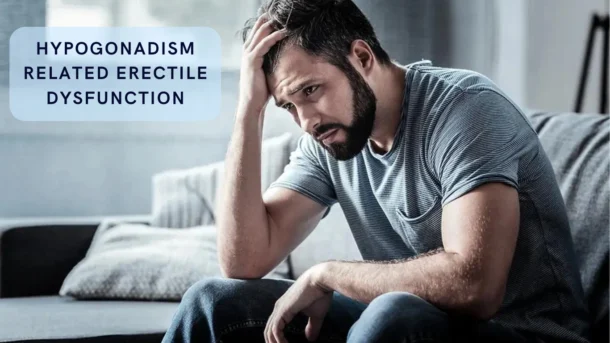Hypogonadism, a condition characterized by low testosterone levels, is increasingly recognized as a significant cause of erectile dysfunction (ED) in men. This article explores five treatment options for managing hypogonadism-related erectile dysfunction in 2024, providing insights into both hormonal and non-hormonal approaches. Effective treatment not only improves sexual function but also enhances overall quality of life.
Understanding Hypogonadism and Erectile Dysfunction
Hypogonadism refers to insufficient production of testosterone, the primary male sex hormone. It is divided into two major types:
- Primary Hypogonadism: Originates from a problem in the testes, where testosterone is produced.
- Secondary Hypogonadism: Results from issues in the hypothalamus or pituitary gland that affect the stimulation of the testes.
Low testosterone levels can lead to erectile dysfunction by impairing libido, affecting penile blood flow, and reducing the quality of erections. Symptoms of low testosterone include fatigue, decreased muscle mass, and reduced sexual desire. Diagnosing hypogonadism typically involves blood tests to measure testosterone levels and evaluate underlying causes.
References: https://www.webmd.com/erectile-dysfunction/erectile-dysfunction
Testosterone Replacement Therapy (TRT)
Testosterone Replacement Therapy (TRT) is a cornerstone in treating hypogonadism. It aims to restore testosterone levels to normal, alleviating symptoms and improving erectile function.
Types of TRT:
- Injections: Administered every 1-2 weeks, offering a reliable increase in testosterone levels.
- Patches: Worn daily on the skin, providing a steady release of testosterone.
- Gels: Applied to the skin daily, allowing for a consistent absorption of testosterone.
- Pellets: Implanted under the skin, releasing testosterone over several months.
Benefits: TRT can significantly improve erectile function, mood, and overall well-being.
Considerations: Possible side effects include acne, increased red blood cell count, and potential cardiovascular risks. New advancements in TRT for 2024 include more precise delivery methods and personalized treatment plans based on genetic and lifestyle factors.
References: https://www.mayoclinic.org/healthy-lifestyle/sexual-health/in-depth/testosterone-therapy/art-20045728
Lifestyle Modifications and Natural Treatments
In addition to medical treatments, lifestyle changes can play a crucial role in managing hypogonadism-related erectile dysfunction.
- Diet and Nutrition: Consuming a balanced diet rich in vitamins and minerals, such as zinc and vitamin D, supports healthy testosterone levels.
- Exercise: Regular physical activity, particularly resistance training, can boost testosterone and improve sexual health.
- Stress Reduction: Techniques like mindfulness, meditation, and adequate sleep help manage stress, which can negatively impact testosterone levels.
- Natural Supplements: Supplements like fenugreek, ashwagandha, and tribulus terrestris have been studied for their potential to support testosterone levels. However, their efficacy and safety should be discussed with a healthcare provider.
Medications and Non-Hormonal Treatments
For men who cannot or prefer not to use TRT, non-hormonal treatments offer alternative options:
- PDE5 Inhibitors: Medications such as Viagra (sildenafil), Cialis (tadalafil), Levitra (vardenafil), and Stendra (avanafil) enhance erectile function by increasing blood flow to the penis. These are frequently the first-line treatments for ED.
- Intracavernosal Injections: Drugs like alprostadil can be injected directly into the penis to induce an erection. This method is effective but requires proper technique and may cause discomfort.
- Vacuum Erection Devices: These devices create a vacuum around the penis, drawing blood into it and aiding in achieving an erection. They are non-invasive but can be cumbersome to use.
Addressing Underlying Causes and Co-Conditions
Successful management of hypogonadism-related erectile dysfunction often requires addressing underlying health conditions:
- Chronic Conditions: Managing diabetes, cardiovascular diseases, and other chronic illnesses can improve erectile function.
- Psychological factors: stress, anxiety, and sadness can worsen ED. Psychological therapy or counseling can be beneficial in addressing these issues.
- Multidisciplinary Approach: A combined approach involving endocrinologists, urologists, and mental health professionals ensures comprehensive care and effective treatment of both hypogonadism and erectile dysfunction.
Conclusion
In 2024, several effective treatments will be available for managing hypogonadism-related erectile dysfunction. From testosterone replacement therapy to lifestyle modifications and non-hormonal treatments, a personalized approach can significantly enhance sexual health and overall well-being. Consulting with healthcare professionals is crucial for determining the most appropriate treatment plan tailored to individual needs.



